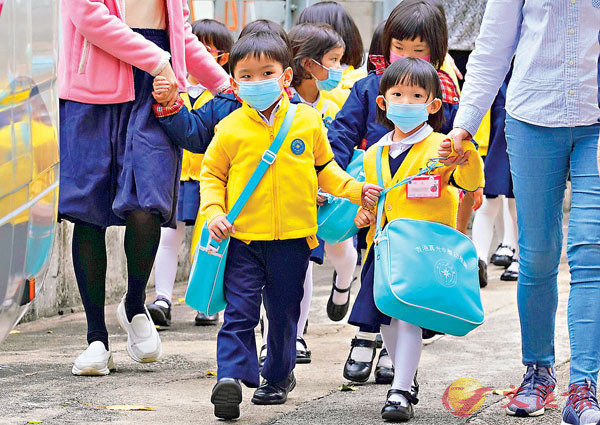 ● 育兒經濟壓力大,導致港人不願生育。 資料圖片
● 育兒經濟壓力大,導致港人不願生育。 資料圖片【原文】香港婦聯的本港生育意願調查發現,有近六成受訪者不願意生育,當中逾九成人認為育兒經濟壓力大是主因,數字比2019年高。受土地房屋、貧富懸殊等深層次矛盾困擾,再加上本港生活負擔高踞全球前列,年輕人向上流動機會漸減,難免窒礙生育意願,勢必加速本港人口老化,削弱整體競爭力。政府應推出布局長遠的規劃,營造安居樂業的環境,才能提升港人生兒育女、建設美好家園的意願。
港人生育意願持續下降,其實是本港經濟民生矛盾積重難返、生活壓力與日俱增的一種折射。眾所周知,香港樓價全球最貴,年輕人「上車」越來越難,立法會秘書處《自置居所對香港社會經濟的影響》報告顯示,35歲以下的年輕人士於1997年成為自置業主的機會較高,當時有多達19.81萬名這類年輕戶主,佔自置戶主總數的22.1%;而由於置業負擔能力不斷下降,首次置業人士的平均年齡,於2019年已推遲至44歲。年輕人為供樓「搏殺」,只能推遲生育時間,甚至打消生育念頭。
另外,本港堅尼系數於2016年擴闊至0.539,居於全球最高之列;《經濟學人智庫》公布的「2020年全球生活成本」排名,統計了全球133個城市的生活成本,結果顯示,即使在疫情下,香港生活成本繼續排名全球第一,除了高樓價、高租金外,本港其他日常生活開支、用餐費用、食材價格都名列世界前茅。
生活負擔有增無減,而本港經濟結構單一,產業未能向創新、多元轉型,導致年輕人向上流動的通道和台階減少,實際收入遠追不上樓價、通脹的升幅,令年輕人對未來前景預測悲觀。生育培養下一代的付出和責任重大,奧運冠軍李麗珊多年前有一經典廣告台詞──「養大一個孩子要400萬」,計及通脹,如今養育一個孩子恐怕遠超400萬,年輕人對此難免避而遠之。
本港已呈現人口老化的趨勢,若生育率長期低迷,公共財政、醫療福利將承受更大壓力,勢必出現類似日本的「少子化」問題,影響經濟、社會可持續發展。要提振本港的生育率,僅靠強化家庭的友善政策效果不大,關鍵還在於解決深層次矛盾,為市民減負降壓,讓年輕人對前景充滿信心。
今年兩會期間,國務院副總理韓正參加全國人大香港代表團審議時強調,中央政府全力、全方位支持特區政府及市民,在防疫抗疫、金融領域、創新科技、服務業、航運業等方面,支持行政長官和特區政府一起做好長遠規劃,解決貧富懸殊、住屋等問題。
在中央大力支持下,特區政府應彰顯行政主導,與社會各界齊心協力、迎難而上,下決心有擔當解決土地房屋的難題,改善居住環境;積極融入國家大局、把握粵港澳大灣區機遇,加快本港經濟轉型升級,拓展港人的發展空間,推出更多鼓勵生育的家庭政策,消除年輕人生兒育女的後顧之憂,讓香港煥發生生不息的活力。 ( 摘錄自香港《文匯報》社評 2021-5-11)
Solving deep-rooted conflicts is key to encourage childbearing
【譯文】A survey conducted by the Hong Kong Women Development Association has revealed that nearly 60 per cent of the respondents do not want to have a baby. Over 90 per cent of them cited financial pressure as the main reason, which is higher than the corresponding figure in 2019. Younger generations in Hong Kong have been suffering from the consequences of deep-rooted problems such as land, housing, and income disparity. Coupled with the facts that Hong Kong is among the least affordable cities in the world and that social mobility is declining rapidly, the young people of Hong Kong will inevitably be less willing to have children. Population ageing and weakened competitiveness will surely follow as a result. To encourage childbearing and build a better Hong Kong together, the government should focus its long-term plans on creating a stable environment where people can work and live in peace.
The continuous decline in the willingness of Hong Kong people to have children is, in fact, a reflection of the city's grave socio-economic issues and ever-increasing pressure in life. For instance, it is already well-known that property prices in Hong Kong are the most expensive in the world, and it is becoming more and more difficult for young people to become homeowners. According to the Legislative Council Secretariat's research report "Socioeconomic implications of home ownership for Hong Kong", it is easier for younger people aged under 35 to become a homeowner in 1997. At that time, the number of these young homeowners was as high as 198,100, accounting for 22.1 per cent of total homeowners. As housing affordability continues to drop, the average age of first-time home buyers has already risen to 44 years old in 2019. For the younger generations, childbearing can only give way to their struggle for home ownership. Some of them might even give up on having a baby altogether.
Rising to 0.539 in 2016, Hong Kong's Gini coefficient is also among the highest in the world. According to the Economist Intelligence Unit's "Worldwide Cost of Living 2020" report, Covid-hit Hong Kong is still the most expensive city to live in the world after comparing the costs of living of 133 cities around the globe. Apart from expensive home prices and rents, other daily living expenses such as the costs of meals and food ingredients are also among the highest in the world.
Apart from the ever-rising costs of living, Hong Kong's failure to innovate and diversify its uniform economic structure has led to a lack of upward social mobility for the younger generations. This has resulted in real income levels that cannot catch up with rising home prices and inflation for young people, and has in turn made many pessimistic about their future prospects. Raising children is a great responsibility that requires much sacrifice. Olympic gold medalist Lee Lai-shan once said in a classic TV commercial that "it costs 4 million dollars to raise a child". As it would most likely cost more than that in today's terms after taking inflation into account, it is understandable if young people would back off from having children.
Signs of population ageing are already showing in Hong Kong. The city's public finances and healthcare system will be under even greater pressure if the fertility rate remains low. Like Japan, problems stemmed from sub-replacement fertility will eventually hamper the sustainable development of both the economy and society. Focusing solely on family-friendly policies will have little effect in remedying the situation. The key to boosting the fertility rate in Hong Kong is to resolve the current deep-seated contradictions. The burden on the public needs to be relieved, and young people's confidence in the future must be restored.
In a meeting with the Hong Kong delegation during China's "two sessions" this year, Vice Premier Han Zheng emphasised that the central government fully and comprehensively supports the Hong Kong government and citizens in areas such as epidemic prevention, the financial sector, innovative technologies, the service industry, the shipping industry, etc. The central government also offers support to the Chief Executive and the Hong Kong government in making long-term plans to resolve socio-economic problems such as income disparity and housing.
With the strong support of the central government, the Hong Kong government should demonstrate its leadership and work together with the community to solve the problems of land and housing in Hong Kong. The authorities should also seize the opportunities that are presented by the development of the Greater Bay Area and accelerate the transformation and upgrading of Hong Kong's economy. More family-friendly measures that encourage childbearing should also be rolled out. By eliminating the obstacles that lie in the young people's path to having children, the vitality of Hong Kong will truly be restored.●Jeffrey Tse
Exercise
1. 堅尼系數
2. 人口老化
3. 社會流動
4. 可持續性
5. 貧富懸殊
Answer
1. Gini coefficient
2. population ageing
3. social mobility
4. sustainability
5. income disparity

